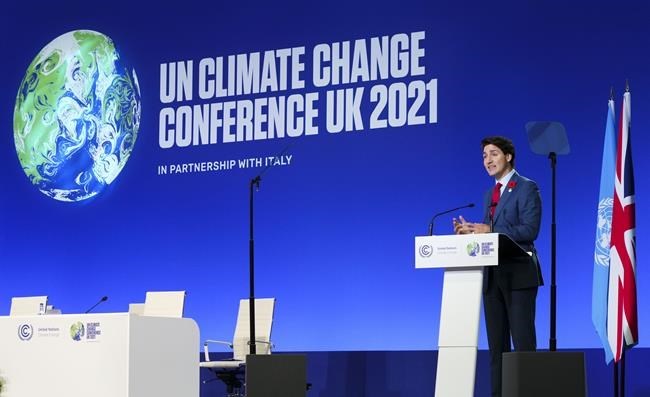CALGARY — The federal government must work co-operatively with industry as it looks to draft an emissions cap for the oil and gas sector, Alberta business leaders said Monday, or risk far-reaching consequences for the Canadian economy.
In an interview Monday, Grant Fagerheim, chief executive of Calgary-based oil company Whitecap Resources Inc., warned of the dangers posed by a federal government that he believes is setting ambitious climate targets that it doesn't know how to achieve.
“Setting out virtue-signaling commitments with no real firm targets is dangerous, and it’s reckless because at the end of the day, this is about the things that we can’t live without — food, heat, clothing and transportation.”
At COP26, the UN climate conference in Scotland on Monday, Prime Minister Justin Trudeau formally committed to a cap on greenhouse gas emissions produced by saąúĽĘ´«Ă˝'s oil and gas industry.
Such a cap had been promised in the Liberals' recent election platform, with plans to force emissions down until they hit net zero in 2050. A lack of regulations for the sector has long been a sore spot between environmental groups and Ottawa.
Newly named Environment Minister Steven Guilbeault along with Natural Resources Minister Jonathan Wilkinson sent a letter to the government's net-zero advisory body Monday asking for its help to develop policy to support the new plan.
But Fagerheim said the oil and gas industry is fearful that politicians have "massively overestimated" the pace and scale at which the global economy can move away from fossil fuels. He said the government must sit down to talk with industry leaders about what is realistic.
While the industry has made huge strides in recent years on reducing emissions intensity (actual emissions from saąúĽĘ´«Ă˝'s oil and gas sector have actually increased over time due to increased production), Fagerheim said hobbling the industry with unachievable targets will result in higher prices for Canadian consumers. He added it will also mean fewer profits for energy companies to funnel into emission-reduction technologies and renewables projects.Â
Adam Legge, president of the Business Council of Alberta, said he believes oil and gas companies already understand the need to reduce emissions. He pointed to the Oil Sands Pathway Alliance, an initiative of saąúĽĘ´«Ă˝'s five largest oilsands producers that have committed to achieving net-zero greenhouse gas emissions by 2050.Â
But Legge said factors like available technology, the costs of implementing that technology, and the implications for Canadians in terms of energy availability and price all must be considered before settling on a specific cap.
“If done wrong, it has a number of potential impacts, including a tremendous amount of lost jobs, lost economic activity — and this is not just Alberta, this is saąúĽĘ´«Ă˝-wide," Legge said.Â
Alberta already has a provincially legislated 100 megatonne cap on oilsands emissions, implemented under former NDP premier Rachel Notley.Â
United Conservative Premier Jason Kenney told reporters Monday that his government has proposed that limit as an acceptable number for a federal cap, but said so far, the Trudeau government has not engaged with Alberta on the topic.
“The government of saąúĽĘ´«Ă˝ has zero chance of achieving its greenhouse gas reduction targets without Alberta’s oil and gas industry," Kenney said. "We need to be partners in this."
Kenney said rather than "throw out big numbers at international conferences," the Trudeau government should be assisting Alberta companies that are investing in emissions reductions technologies.
“The single most important way the prime minister could help us would be putting real resources behind a huge expansion of Alberta’s carbon capture and storage technology," Kenney said.
But climate change activists said Trudeau's pledge Monday fell short, by focusing on emissions from oil and gas production and not overall production levels.
"(This) will allow oil and gas companies to keep putting forward false solutions, such as carbon capture and storage, fossil-based hydrogen, and far-off net zero plans, all while pumping out more and more atmosphere-destroying fossil fuels,” said Dale Marshall, national climate program manager with Environmental Defence in a statement.Â
“We cannot go from climate laggard to even the middle of the pack without curtailing oil and gas production, starting now.”
The Canadian Association of Petroleum Producers warned Monday that countries that lack affordable and reliable access to energy will be forced to turn to even more carbon-intensive sources, such as coal. In a statement, CAPP president Tim McMillan said saąúĽĘ´«Ă˝ — under the right policy environment — can position itself as a "preferred supplier" of "lower emission" natural gas and oil.
"It will be incredibly important for the federal government and the natural gas and oil industry to work collaboratively to ensure we meet our environmental and social outcomes," McMillan added in an email.
With files from Mia Rabson
This report by The Canadian Press was first published Nov. 1, 2021.
Companies in this story: (TSX:WCP)
Amanda Stephenson, The Canadian Press



